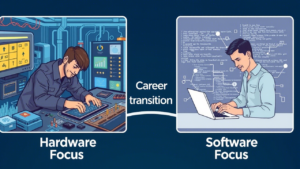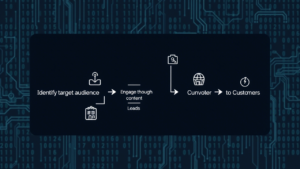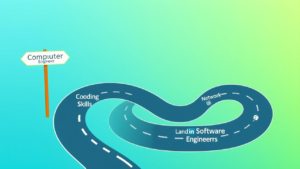Let’s get one thing straight: if you’re running a business, especially in the tech world, you need leads. Not just any leads, though. You need the right leads. That’s where B2B lead generation comes in. But what does this have to do with someone transitioning from a computer engineer to a software engineer? Stick around, because I’m about to connect the dots in ways that’ll make sense—and maybe even inspire you.
Whether you’re trying to grow your company or pivot your career, understanding B2B lead generation will give you an edge. Let’s break it down step by step.
What Exactly Is B2B Lead Generation?
First things first, let’s define the term. B2B lead generation is all about finding businesses (not individual consumers) who might be interested in what you’re selling. Think of it as matchmaking but for companies.
For example, imagine you’re a computer engineer looking to transition into software engineering. You’d want to find companies hiring for those roles, right? Same principle here, but on a larger scale. The goal is to attract decision-makers, like hiring managers or procurement teams, who are ready to take action.
Why does this matter? Because without leads, your sales team has nothing to work with. And without sales, well… you don’t have much of a business. So yeah, lead generation is kind of a big deal.
The Role of Lead Generation in Business Growth
Think of B2B lead generation as the fuel for your business engine. No fuel, no movement. Here’s why it’s so important:
- Revenue Driver: More leads = more opportunities to close deals.
- Market Expansion: It helps you reach new industries and niches.
- Competitive Edge: Stay ahead by targeting high-value clients before your competitors do.
Now, back to our computer engineer-to-software engineer analogy. If you’re making a career change, you’re essentially generating “leads” for yourself. You’re identifying roles, companies, and industries where your skills can shine. Both processes require strategy, patience, and persistence.
Transitioning Roles: Leveraging Your Skills
If you’re a computer engineer thinking about becoming a software engineer, guess what? You already have a head start. Many of the skills you’ve honed—problem-solving, analytical thinking, and coding—are directly transferable.
Here’s how to leverage them:
- Coding Skills: Whether you’ve worked with C++, Python, or Java, these languages are gold in software engineering. Brush up on them through platforms like Coursera or Udemy.
- System Design Knowledge: As a computer engineer, you understand how systems work together. This gives you an edge when designing scalable software solutions.
- Attention to Detail: Debugging hardware issues teaches you to spot problems early—a skill every software engineer needs.
Transition tip: Internal Link Placeholder – Check out our article on “Top Coding Languages Every Software Engineer Should Know.”
Steps to Make the Career Change Smoothly
Switching from a computer engineer to a software engineer isn’t as scary as it sounds. Follow these steps to make the transition seamless:
- Identify Gaps: What extra skills do you need? Maybe it’s learning cloud computing or mastering DevOps tools.
- Upskill: Take online courses or attend workshops. Platforms like edX offer excellent resources.
- Build Projects: Create a portfolio showcasing your newfound abilities. Employers love seeing practical examples.
- Network: Connect with other engineers on LinkedIn or at meetups. Networking is just another form of lead generation—this time for your career!
Pro tip: Don’t rush. Take small steps daily, and soon you’ll see progress.
Challenges You Might Face During the Transition
Let’s keep it real—switching careers isn’t always sunshine and rainbows. Here are some common hurdles:
- Imposter Syndrome: Feeling like you don’t belong? Join the club. Everyone feels this way during a career change.
- Learning Curve: Picking up new coding frameworks or methodologies can feel overwhelming.
- Job Market Competition: There are tons of people vying for software engineering roles. Standing out takes effort.
But hey, challenges aren’t roadblocks—they’re stepping stones. Remember, B2B lead generation also faces obstacles like low-quality leads or tough competition. The key is persistence.
Benefits of Making the Switch
Still on the fence? Let me sell you on the perks of becoming a software engineer:
- Higher Demand: Software engineers are in demand across industries, from healthcare to finance.
- Creative Freedom: Unlike hardware design, software lets you experiment and innovate endlessly.
- Better Paychecks: On average, software engineers earn more than computer engineers. Cha-ching!
Fun fact: Many successful software engineers started as computer engineers. Their background gave them a unique perspective that set them apart.

A Real-Life Success Story
Meet Alex (not their real name). Alex was a computer engineer working on embedded systems for years. But they wanted something different—something more dynamic. So, they took online courses, built side projects, and networked like crazy. Within six months, Alex landed a role as a junior software engineer at a top tech firm.
How did Alex succeed? By treating their job search like a B2B lead generation campaign. They identified target companies, tailored their resume, and followed up consistently. Sound familiar?
Tools and Resources to Help You Succeed
You don’t have to go it alone. Here are some tools and resources to guide your journey:
- Online Learning Platforms: Coursera, Udemy, and Codecademy
- Networking Sites: LinkedIn is your best friend. Use it to connect with professionals in your desired field.
- Project Hosting: GitHub is perfect for showcasing your code and collaborating with others.
Internal Link Placeholder – Want more? Read our post on “Best Tools for Aspiring Software Engineers.”
Wrapping Up: Why B2B Lead Generation Matters (and So Does Your Career)
So, why is B2B lead generation important? Because it drives growth, builds relationships, and ensures sustainability. And if you’re transitioning from a computer engineer to a software engineer, think of your career move as a personal lead-gen project. Identify opportunities, nurture connections, and close the deal.
Ready to take the next step? Start by enrolling in a course, updating your LinkedIn profile, or reaching out to someone in the industry. Small actions lead to big results.
Call-to-action: Share your thoughts below! Are you considering a career change? What challenges are you facing? Let’s chat.

Conclusion: Why B2B Lead Generation and Career Growth Go Hand in Hand
Here’s the bottom line: whether you’re running a business or pivoting your career, success comes down to one thing—connecting with the right people. In B2B lead generation, it’s about finding businesses that need your product or service. When transitioning from a computer engineer to a software engineer, it’s about connecting with companies and roles that value your unique skill set.
Both processes require strategy, persistence, and adaptability. Just like a well-oiled lead generation machine, your career transition should focus on identifying opportunities, nurturing relationships, and delivering value. The good news? You already have many of the tools you need—problem-solving skills, technical expertise, and a hunger to grow.
So, what’s next? Take action. Start small but stay consistent. Enroll in a coding course, update your LinkedIn profile, or reach out to someone in the software engineering field. Every step counts. Remember, even the most successful engineers and entrepreneurs started somewhere.
Ready to take charge of your future? Share your thoughts below or check out our other posts for more tips on career changes and professional growth. Let’s build something amazing together!
FAQs
Q1: Is it hard to transition from a computer engineer to a software engineer?
Not necessarily. With the right mindset and resources, it’s achievable. Focus on building coding skills and gaining hands-on experience.
Q2: What’s the difference between computer engineering and software engineering?
Computer engineering focuses on hardware and system architecture, while software engineering is all about developing applications and programs.
Q3: Do I need a degree to become a software engineer?
Nope! Many companies value practical experience and certifications over formal degrees. Just prove you can code.
Q4: How long does the transition usually take?
It depends on your pace, but most people complete the process within 6-12 months.
Q5: What industries hire software engineers?
Almost all of them! From tech startups to government agencies, there’s no shortage of opportunities.



